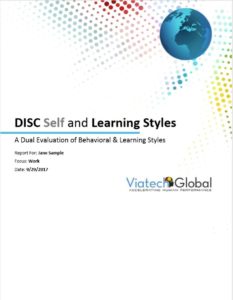
DISC & Learning Styles Report
All learners are not equal, nor identical. They are molded in part by their different cultures; familial, regional and national. Similarly, their individual past experiences will also play significant roles in determining how they receive and retain information.
- Some people like to process information through text, while others need visual support and images.
- Some learners best assimilate information alone, while others prefer to work in groups.
- There are people who can grasp information quickly and intuitively.
- Then, there are people who prefer to follow a strong sequential path an take time to reflect.
In the end the only thing you can say with certainty is this: Every individual learns in their own particular way.
By combining the powerful “behavioral needs” analysis of our DISC assessment with the insightful “cognitive means” analysis of the Learning Styles assessment, we’re able to identify each individual’s intermingling composite. The result? A roadmap that lays out the unique interplay between how each individual learns and why. Those composites can provide an organization’s leaders the necessary information to maximize time spent training new employees or even introducing current employees to new methodologies. Moreover, the knowledge gained on how to train each employee can yield countless returns as new learning always accompanies the change and adaptation inherent to the 21st century workplace.
The Learning Styles assessment is an instrument designed to measure the learning style of an individual in most situations.
This encompasses four categories:
- attending
- translating
- relating
- understanding
The Learning Styles questionnaire is intended to help determine where people’s general preferences, or natural learning biases, might lie. Although this is far from an exact science, the simple view is that the more we can understand about how we perceive new information or new learning, the better and more successful our learning transfer will be.
The goal of the DISC is to help you create personal chemistry and productive relationships. You do not have to change your personality; you simpy have to understand what drives people and recognize your options for effectively dealing with them. DISC teaches you powerful life skills that will serve you well in all your relationships: business, social and family.
Our DISC reports are as much prescriptive as they are descriptive! We spend as much time teaching you how to improve your own interpersonal interactions as we do describing your natural DISC behavioral style.
